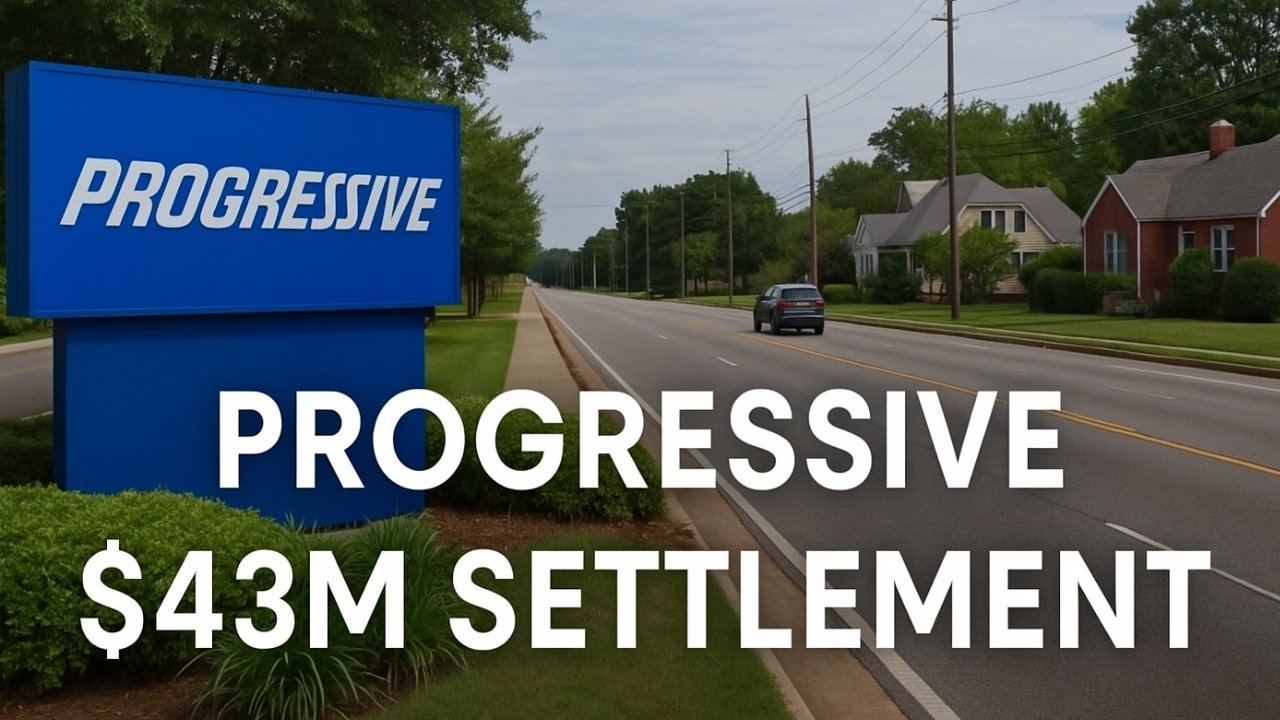In a major resolution that impacts thousands of vehicle owners across Georgia, Progressive Insurance has agreed to a $43 million class action settlement to address allegations that it undervalued total loss vehicle claims. The case centered on the insurer’s use of a pricing method that, according to plaintiffs, resulted in systematically lower payouts for policyholders whose vehicles were deemed total losses after accidents or thefts.
The core issue revolves around the application of a “Projected Sold Adjustment” (PSA) a deduction applied by Progressive when calculating vehicle values using third-party valuation software. Claimants argued that this adjustment unfairly reduced the estimated market value of their cars, leaving them undercompensated.
Although Progressive has denied any wrongdoing, it chose to settle to avoid prolonged litigation. The settlement promises automatic cash payments to eligible policyholders, with no need for a claims form, ensuring that compensation reaches affected individuals without administrative hurdles.
Who Is Covered Under the Settlement?

The settlement benefits are limited to Georgia residents who filed first-party total loss claims with specific Progressive insurance entities and had their vehicle valuations adjusted using Mitchell’s Instant Report with the PSA applied to one or more comparable vehicles. These adjustments were allegedly misleading and led to unfairly reduced claim payments.
To qualify, policyholders must have had one of the following insurance types:
| Insurance Provider | Eligibility Period |
|---|---|
| Progressive Mountain Insurance Co. | Oct. 11, 2015 – Feb. 18, 2025 |
| Progressive Premier Insurance Co. of Illinois | June 8, 2016 – Feb. 18, 2025 |
Only claims involving Georgia policyholders are covered under the settlement terms. The affected class includes individuals whose cars were declared total losses and whose valuations included at least one PSA adjustment during the covered timeframes.
This large settlement spans nearly a decade of claims activity, making it one of the more impactful auto insurance settlements in recent years in the state.
Core Allegations Behind the Lawsuit
Plaintiffs in the class action lawsuit accused Progressive of using a flawed valuation method that decreased payouts by applying speculative adjustments. The “Projected Sold Adjustment” involved estimating a lower final sale price for comparable vehicles used in determining the value of the claimant’s vehicle. According to the legal claim, this practice resulted in misleading market values.
The lawsuit contended that this method violated Georgia’s insurance regulations and consumer protection laws, as it didn’t represent a fair market valuation. While Progressive maintains that the valuation process was sound and industry-standard, it opted to resolve the dispute through this financial settlement rather than risk an unfavorable verdict in court.
Settlement Payment Structure and Deadlines
All eligible class members will receive automatic cash payments. The estimated average payout per person is around $173, though this amount may vary based on the total number of claimants who fall under the settlement’s criteria.
| Key Settlement Terms | Details |
|---|---|
| Total Settlement Amount | $43 million |
| Estimated Average Payout | $173 per person |
| Claim Form Requirement | None – automatic payment |
| Exclusion/Objection Deadline | April 30, 2025 |
| Final Approval Hearing | May 15, 2025 |
Payments will be distributed only after the court grants final approval. Those who wish to object to or exclude themselves from the settlement must act before the April 30, 2025, deadline. Otherwise, participation is automatic, and eligible individuals will forfeit the right to pursue separate legal action on the same matter.
What Policyholders Should Know and Do
Even though no claims form is required, affected Georgia residents should take a few steps to ensure that the settlement reaches them without delay. The process has been designed to be as frictionless as possible, but staying informed and prepared is still essential.
- Check your mail and email for a notice confirming eligibility.
- Update your contact information with Progressive or the settlement administrator.
- Do not ignore communications that appear official, even if no action is requested.
- Consult a legal expert if you are unsure about your inclusion or wish to opt out.
The simplicity of the process, paired with the lack of a claim form, means that most eligible individuals will not need to do anything except wait for the payment once the court gives final approval.
Broader Industry Implications and Consumer Lessons
The Progressive settlement highlights the growing scrutiny over how insurers calculate vehicle values and settle total loss claims. While valuation models and software are common tools in the insurance industry, their use must still comply with transparency standards and consumer protection laws.
This case underscores the importance of consumer awareness in insurance dealings. Policyholders are often unfamiliar with the technical methods used to value their losses, making them vulnerable to underpayment without even realizing it. The class action lawsuit and resulting settlement may prompt other insurance providers to re-evaluate their valuation practices to avoid similar legal challenges.
- Always request detailed valuation reports when filing a total loss claim.
- Question any unfamiliar adjustments or deductions.
- Stay aware of your rights under state insurance laws.
- Follow up on class action lawsuits or settlements involving your insurance provider.
While this case was specific to Georgia, it may serve as a precedent for similar lawsuits in other states, especially if insurers use comparable valuation methodologies.
The $43 million settlement between Progressive Insurance and Georgia policyholders is not just about financial restitution—it is also a reminder that consumer vigilance matters. Insurance companies are required to deal fairly with their customers, and when they fail to do so, the legal system can provide a path to resolution.
Policyholders who meet the eligibility criteria should receive their payments automatically after the final hearing in May 2025. For many, this marks a long-overdue correction to a system that may have quietly denied them the full value of their insurance claims.